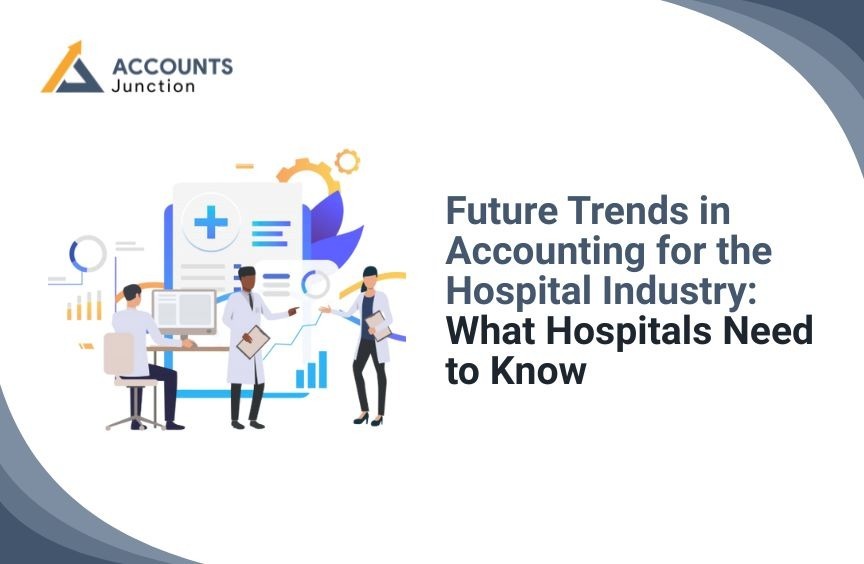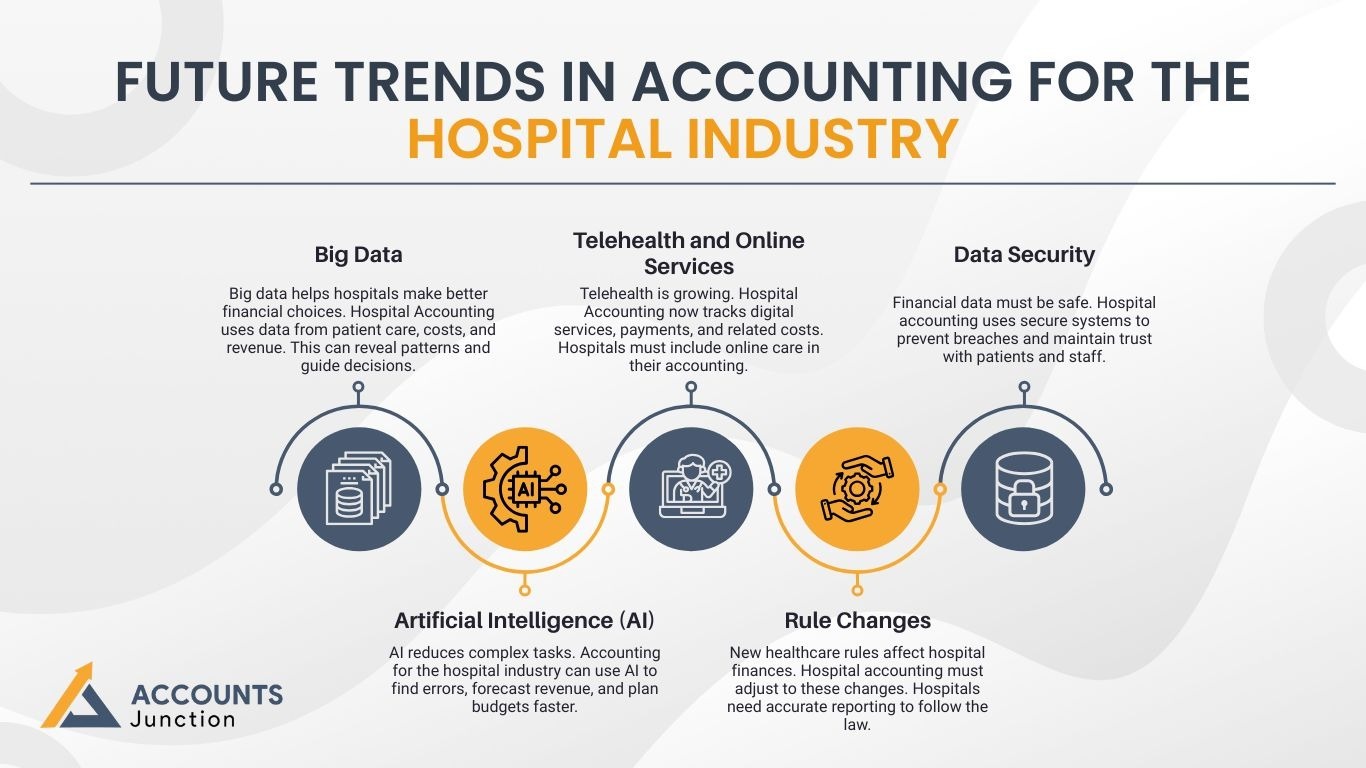
Future Trends in Accounting for the Hospital Industry: What Hospitals Need to Know
Accounting for the hospital industry is changing fast as costs rise and rules shift. Sick people need more care, and hospitals must track cash, plan spending, and make smart choices. Strong money tracking helps hospitals manage funds, cut risks, and stay financially safe.
How hospitals use cash affects patient care, staff pay, and tools. Rule changes, new tech, and patient needs create challenges. Hospitals that plan well reduce risks and keep funds secure.
This guide shows trends in hospital accounting, the main challenges, and ways to manage funds well.
Why Money Tracking Matters for Hospitals
Money tracking is more than keeping books. It helps hospitals watch cash, plan growth, and follow rules. Hospitals get cash from patients, claims, and the state. Clear money tracking keeps cash right, cuts mistakes, and helps plan.
1. Controlling Costs
- Cost control is key. Tracking money shows where cash goes for staff, tools, and care. Hospitals can cut waste, save cash, and work more smoothly.
2. Following Rules
- Hospitals must meet strict rules. Tracking money makes sure reports match state and claim rules. This helps avoid fines and keeps the ward safe.
3. Planning Ahead
- Money tracking shows where cash can go next. It helps plan for new staff, tools, or care. Hospitals can be ready for costs that come up.
4. Supporting Patient Care
- Clear tracking helps hospitals care for sick people. When cash is used right, staff are paid, tools are ready, and care stays safe.
5. Helping Decisions
- Tracking money gives the team a clear view of cash. It helps them make smart choices on staff, tools, and care. Clear reports help spot problems early, plan growth, and act fast.
Financial Planning and Budgets in Hospitals
Hospitals need clear plans for money. Accounting for the hospital industry helps track cash and set budgets. Budgets show where money goes and help cut waste.
1. Predicting Income
- Hospitals need to know what cash will come in. Past data and trends help guess income from patients, claims, and the state. This helps avoid cash shortfalls and poor choices.
2. Assigning Resources
- Hospitals must spend money smartly. Budgets show where to put cash for staff, tools, and care. Smart use keeps work smooth and care safe.
3. Planning for Growth
- Plans help hospitals grow without risk. Budgets show where cash can go to add staff, new tools, or services. Hospitals can be ready for the needs ahead.
4. Checking Budgets
- Budgets need checks. Track spend vs. plan to spot overuse, shift cash, and stay on track.
5. Handling Unexpected Costs
- Extra costs can happen, like repairs or extra staff. Plans let hospitals save cash for such needs and keep care steady.
6. Watching Progress
- Hospitals must watch how plans work. Track spend and match it with the budget to spot gaps early. This lets hospitals act fast and keep care steady.
Technology in Hospital Accounting
Technology is changing the accounting for the hospital industry. New tools simplify reporting, automate tasks, and protect data.
1. Automation of Tasks
Automation saves time and cuts errors. Hospital accounting uses software to manage billing, payroll, and reports. Staff can focus more on patient care.
2. Cloud Systems
Cloud accounting offers flexibility. Hospitals can access data easily, share information faster, and keep records safe. The hospital industry benefits from cloud systems in all these ways.
Future Trends in Accounting for the Hospital Industry
Accounting for the hospital industry is evolving. Hospitals must watch trends to stay competitive and efficient.
-
Big Data
Big data helps hospitals make better financial choices. Hospital Accounting uses data from patient care, costs, and revenue. This can reveal patterns and guide decisions.
-
Artificial Intelligence (AI)
AI reduces complex tasks. Accounting for the hospital industry can use AI to find errors, forecast revenue, and plan budgets faster.
-
Telehealth and Online Services
Telehealth is growing. Hospital Accounting now tracks digital services, payments, and related costs. Hospitals must include online care in their accounting.
-
Rule Changes
New healthcare rules affect hospital finances. Hospital accounting must adjust to these changes. Hospitals need accurate reporting to follow the law.
-
Data Security
Financial data must be safe. Hospital accounting uses secure systems to prevent breaches and maintain trust with patients and staff.

Future Challenges in Hospital Accounting
As hospitals use new tools and tech, accounting for the hospital industry may face new problems that affect cash, staff, and daily work.
Expected Challenges
- High Costs: New tools and apps can cost much. Hospitals must plan cash well to avoid running out and keep work running smoothly.
- Staff Training: Teams must learn new ways to track money. Time and practice help staff work fast and avoid errors.
- Data Safety: Keeping money and patient info online can be risky. Safe tools and regular backups help stop loss or theft.
- Complex Reports: Online care adds cash streams. Hospitals must track each one to keep reports clear and true.
- Rule Updates: Health rules change fast. Hospitals must update reports to follow rules and avoid fines.
- Tool Integration: New apps must work with old tools. Hospitals must take steps to avoid delays or mistakes.
Solutions and tips to handle Future accounting challenges
Hospitals can use smart steps to take advantage of new trends in tech and finance while keeping accounting for the hospital industry accurate and risks low.
Recommended Solutions
- Use Modern Tools: Introduce apps that handle billing, payroll, and reports. This reduces mistakes and frees staff to focus more on patient care.
- Train Staff: Teach teams to use new tools and follow clear rules. Proper training helps staff track money well and avoid errors.
- Protect Data: Keep all cash and patient information safe using backups, passwords, and secure access to avoid loss or theft.
- Simplify Reporting: Track all money from patients, online care, and insurance. Clear, simple reports help hospitals make quick and safe decisions.
- Regular Checks: Review accounts and budgets often to catch mistakes early. This keeps reports accurate and ensures rules are followed.
- Stepwise Updates: Add new tools in small steps. Testing each part before use avoids errors, disruption, and confusion for staff and patients.
Conclusion
Accounting for the hospital industry is changing fast. Hospitals that track cash, plan budgets, and spend wisely can cut risks, save money, and give steady care. Strong accounting today sets hospitals up for growth and long-term success.
With Accounts Junction, hospitals can simplify accounting, manage payroll, and track funds with ease. Its secure and smart tools help staff plan budgets, follow rules, and focus on quality patient care.
Prepare for the future of hospital accounting with Account Junction. Our tools help hospitals track funds, plan budgets, and build a strong base today for tomorrow.
FAQs
1. What is accounting for the hospital industry?
- It is the process to track cash, spending, and funds in hospitals to plan budgets and keep money safe.
2. Why is accounting important for hospitals?
- It helps hospitals cut costs, plan staff and tools, follow rules, and make sure money is used right.
3. How does accounting help reduce hospital costs?
- By tracking spend on staff, tools, and care, hospitals can find waste, save cash, and work more smartly.
4. How does technology help hospital accounting?
- Apps and tools save time, cut mistakes, and let staff track cash and reports fast and clearly.
5. What is the benefit of cloud accounting in hospitals?
- Cloud tools let staff see money data, share it fast, and track cash and spend from any place.
6. Why is data safety key in hospital accounting?
- Hospitals keep cash and patient info safe. Tools and backups stop loss, theft, and errors.
7. How does telehealth affect hospital accounting?
- Online care adds cash streams and bills. Hospitals must track each to keep reports correct.
